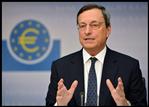
Eurozone proved to be resilient to many shocks this year amid the uncertainty arising from the economic and political environment, largely due to the stimulus measures adopted by the European Central Bank, the bank's chief Mario Draghi said Monday.
"In 2016 the euro area economy proved to be resilient, in spite of uncertainty stemming from the economic and political environment," ECB President Draghi said in his opening remarks at a hearing in the European Parliament in Brussels.
"Inflation has gradually edged up, and the ECB's monetary stimulus has been a key ingredient of the ongoing recovery."
The euro area economy continues to expand at a moderate, but steady pace and this gradual upward trend is expected to continue, Draghi said.
"Still – if supported by decisive action taken by other policymakers – monetary policy measures in the euro area could be even more effective," he added.
The Governing Council is set to hold to announce its next policy decision on December 8. The ECB is widely expected to extend its asset purchases beyond March 2017.
The ECB chief also noted that low productivity growth, legacy problems in the banking sector and limited progress with structural reforms are all issues that need to be tackled swiftly.
Resolving these would help close the output gap faster and increase growth potential, resulting in higher employment, he said.
Regarding the impact of 'Brexit' on the euro area, Draghi said it was difficult to predict the precise economic implications of the event and they will notably depend on the timing, progress and final outcome of the upcoming negotiations.
He also said it was important to have clarity on the 'Brexit' negotiation process as soon as possible in order to reduce uncertainty.
Draghi stressed that the Single Market cannot be reversed though the decision of the U.K. to leave the European Union have created some uncertainty regarding the country's participation.
"It is imperative that its integrity and the homogeneity of rules and their enforcement will be preserved," he said.
"This also means we cannot take backward steps concerning the regulatory, supervisory and oversight framework for banks and financial market infrastructures, which has been enhanced considerably since 2008."
by RTT Staff Writer
For comments and feedback: editorial@rttnews.com
Economic News
What parts of the world are seeing the best (and worst) economic performances lately? Click here to check out our Econ Scorecard and find out! See up-to-the-moment rankings for the best and worst performers in GDP, unemployment rate, inflation and much more.

